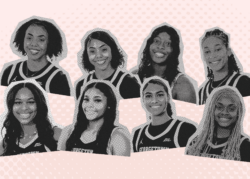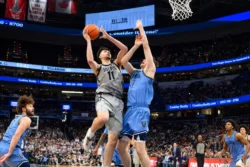The life of a college athlete can be hectic, to say the least. With practice and games, not to mention a full schedule of classes, athletes can hardly be blamed for not finding the time to get out into the community.
But a group of Hoyas are refusing to let their sports serve as an excuse from service. They’ve shown that not only can athletes give back, they can use their unique position to help fight one of their city’s greatest problems.
Tyler Spencer (GRD ’09) knows the good sports can do. He saw it first hand when he spent a summer in South Africa working with Grassroot Soccer, the non-profit that uses the power of soccer as a vehicle to educate African youth about HIV/AIDS.
Spencer, a member of Georgetown’s heavyweight crew team, never forgot his experience in Africa. He went back last summer to check on the community he worked in and ended up writing his thesis on the program. Spencer continued his work with HIV/AIDS at school by volunteering with Metro Teen AIDS, the only non-profit in the area focused on youth HIV prevention.
“With [Metro Teen AIDS] I’ve realized how big of a problem HIV is in D.C.,” he said. “I figured this was a great place to try and launch a program that built on the successes of Grassroot Soccer.”
Thus Grassroot Hoyas was born. Spencer took it upon himself to recruit his fellow athletes and form an outreach program to educate D.C.’s youth about living healthy lives. Using his position on the Student Athletic Advisory Council, he reached out to participants in all of Georgetown’s varsity sports and found 40 willing athletes to take the mandatory 30-hour training session and commit to working three hours a week in local schools.
The aid of Grassroot Hoyas has not come a moment too soon for Washington, D.C. The city’s HIV/AIDS infection rate has well surpassed epidemic levels, with a recent Department of Health report finding that at least 3 percent of District residents have the disease. In his own backyard, Spencer found a community facing a more severe AIDS problem than in some parts of Africa.
With a problem that pervasive, it is essential for education and awareness to begin at a young age. Sports offer at-risk children a bridge to an issue they may never have approached otherwise.
“Using the power of sports to fight HIV in D.C. happens in three ways,” Spencer said. “One, you use the role model status of athletes to make that connection with the kids. Two, you use sports in our actual curriculum. We’ve taken a didactic curriculum that you usually just go into classrooms and teach kids and turned it into competitive activities that teach key messages. And thirdly, we play sports with the kids aside from the lessons that we teach.”
Having a gym instead of a classroom and NCAA athletes instead of school teachers has allowed the kids to make a strong connection with the program.
“The teachers in the schools say that the kids really look forward to us coming and talk about Grassroot Hoyas,” Spencer said. “One of the teachers was saying that kids were coming up saying I want to apply to be in after-school programming just so I can do Grassroot Hoyas.”
Although Spencer will be graduating this year, he is not ready to leave his fledgling program behind. He has been accepted to a Masters program at Harvard next year, but after seeing Grassroot Hoyas take off, he hopes to defer his enrollment and continue to expand the program here in the District. Eventually, he wants to see chapters of the organizations at all the area’s major universities.
“This is something that has the potential to really be taken to scale,” he said. “My desire to stay here, though, comes from the realization that not only is expansion possible, but programs like Grassroot Hoyas are needed here. Educating youth and working to stop the spread of this disease is something we can’t just turn our shoulders to.”
Even if Spencer ends up in Cambridge next year, Grassroot Hoyas will continue its work. In just a short period of time, the organization has taken hold at Georgetown, and the student-athletes have become devoted to the cause. It’s just in their competitive nature. In the matchup between Washington D.C. and AIDS, they won’t let their city lose.





